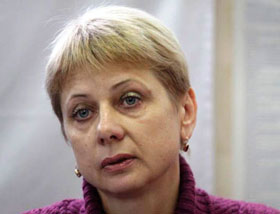UN Human Rights Committee rules in the case of Uladzislau Kavaliou
Mrs. Liubou Kavaliova, the mother of Uladzislau Kavaliou (Kovalev), executed
for plotting and implementing a lethal blast in Minsk underground in April
2011, received the decision of the UN Human Rights Committee. The complaint
was considered in less than a year. The
Committee recognized that the investigation was conducted with numerous errors,
Kavaliou was subjected to physical violence and forced to testify against
himself, the court was not impartial and, most importantly, the right to life was
violated.
The
complaint was filed to the UN Human Rights Committee on December 14, 2011. It
was signed by both Liubou Kavaliova and her daughter Tatsiana Kaziar, and was
registered the following day.
During
its correspondence with the UN HRC, the Belarusian government constantly challenged
the registration of the complaint, while the procedures have never been appealed
by any country. In
their responses, the Belarusian authorities stressed that it was already known
that the Committee's decision would be politicized, and therefore Belarus would
not take it into account.
On
November 21, Liubou Kavaliova received the final decision of the HRC, dated
November 14. According
to lawyer and human rights defender Raman Kisliak, it was the first time the
Committee considered the case so quickly. "Usually
it takes 3-5 years, one of the Belarusian cases was considered for as long as 9
years. 4 more cases on Belarusian executions are still pending at the UN HRC.
Perhaps they will be considered next year," says Mr. Kisliak.
The
Belarusian government did not comment on the Committee’s finding on the alleged
use of violence against the death convict, no investigation that could have
refuted these facts was conducted. Another
violation referred to in the Committee’s findings is that Kavaliou was not
brought to court after his arrest, so that a judge could decided whether he
should be held in jail, or released on his own recognizance. Apart
from that, the presumption of innocence was violated in Kavaliou’s case. He
was held handcuffed in a cage during the court hearing. This
is how he was shown in the media, and this has shaped the attitude to him as a
criminal. In
addition, the state media did not restrain themselves in their evaluations of
the accused, calling Kavaliou a terrorist before sentencing (for example, the
news agency BelTA). The
Supreme Court, which heard the case of the explosion in the Minsk metro, was
not impartial, stresses the Committee’s decision. The
conclusion is based on the fact that motions by defense lawyer Stanislau
Abrazhei were constantly rejected, and those by Prosecutor Aliaksei Stuk were
always granted. The
HRC also admitted that the Belaruisn judiciary violated the right to life and
the right to appeal against conviction and sentence. As
for the rights of applicants (Liubou Kavaliova and Tatsiana Kaziar), the HRC
found a violation of the family’s right to regain the body of the executed, as well
as information on the time and place of his burial. Moreover,
the Committee recommended changing Par. 5 Art. 175 of the Criminal Code, which prohibits
issuing the body to the relatives. It
also recommended that the state published the decision in the state-run mass
media. The
document has been sent to the applicants (Kovaleva and Kaziar), and to representatives
of the government (the Ministry of Foreign Affairs).
According
to lawyer Raman Kisliak, the state actually abstained from providing explanations
and comments on the case. In
July, the government sent to the Committee the film "Underground" produced
by the Agency of TV News (1 Channel of state-owned TV), and, surprisingly, in
German, although the working languages of the UN HRC are Russian and English.
Liubou
Kavaliova said: "Unfortunately, the death penalty has nothing to change.
But my problem is to rehabilitate my son in the eyes of people. The decision of
the UN Human Rights Committee confirms that our questions and claims to the
investigation and the trial were reasonable. That is, the
real terrorists are at large. Moreover, the police are not looking for them. We
will disseminate information on the Committee's decision in the media, so that
more people could learn what is really going on in our law enforcement and
judicial system."
Raman
Kisliak added that human rights defenders will also contribute to the
dissemination of the information and do their utmost to force the state to pay
more attention to conclusions by the UN HRC and contribute to systemic changes
in the future.


